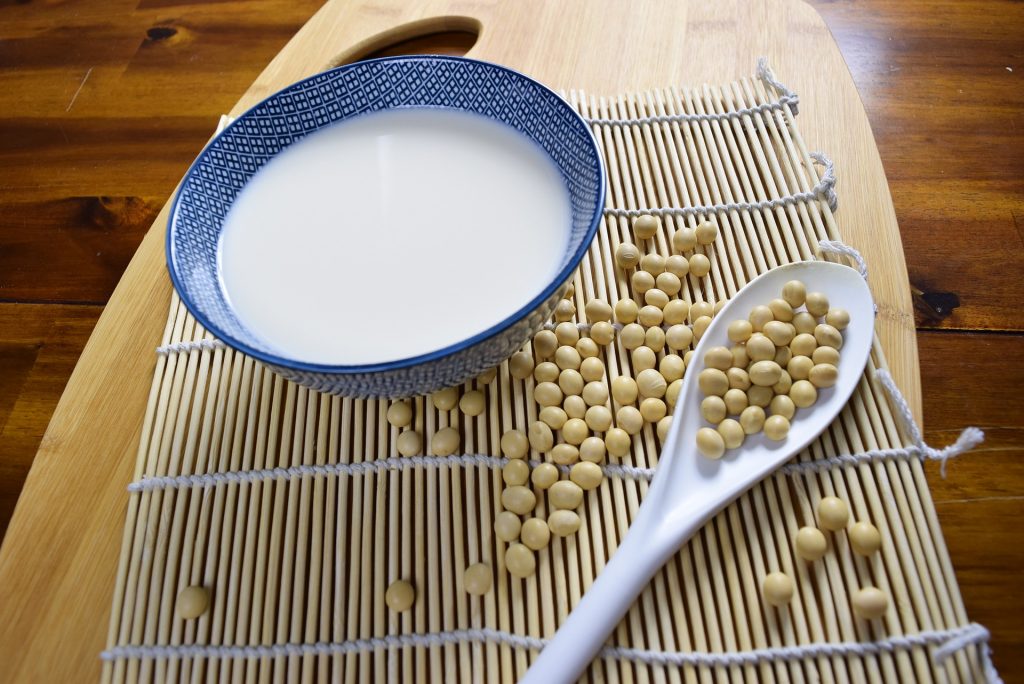 Isoflavones (isoflavonoids) are a group of flavonoids that are found in high concentrations in legumes. Soy for example, is a good source of isoflavones, with other legumes containing much lower levels. Three dietary isoflavones that are of interest to nutritionists are daidzein, genistein and glycitein, which constitute about 35, 60 and 5 % of soy, respectively. Daidzin, genistein and glycitein occur in nature and glycosides (bonded to a sugar). The 7-O-glucoside of daidzein is referred to as daidzin, for example. Consumption of isoflavones may confer health benefits to the consumer, and soy consumption has been shown to have protective effects against both prostate and breast cancer. However, interest has grown in the metabolism of isoflavones by the microbial populations that inhabit the human gut, because some of the health benefits of isoflavones appear to be dependent on the metabolism of isoflavones to other compounds. For example, equol is a derivative of daidzein, and may have protective effects against cardiovascular disease.
Isoflavones (isoflavonoids) are a group of flavonoids that are found in high concentrations in legumes. Soy for example, is a good source of isoflavones, with other legumes containing much lower levels. Three dietary isoflavones that are of interest to nutritionists are daidzein, genistein and glycitein, which constitute about 35, 60 and 5 % of soy, respectively. Daidzin, genistein and glycitein occur in nature and glycosides (bonded to a sugar). The 7-O-glucoside of daidzein is referred to as daidzin, for example. Consumption of isoflavones may confer health benefits to the consumer, and soy consumption has been shown to have protective effects against both prostate and breast cancer. However, interest has grown in the metabolism of isoflavones by the microbial populations that inhabit the human gut, because some of the health benefits of isoflavones appear to be dependent on the metabolism of isoflavones to other compounds. For example, equol is a derivative of daidzein, and may have protective effects against cardiovascular disease.

Gut bacteria are responsible for the production of equol from the isoflavonoid daidzein. Some individuals are not able to produce equol because they lack the required microbial populations. These people are labeled as non-equol producers. However this is slightly disingenuous because phenotype relates to a genetic expression, and the cells responsible for the production of equol are not of human form. There is a strong suggestion here that those that are non-equol producers could become equol producers if they were able to acquire the correct microbial populations. In fact in vitro studies have shown that seeding simulated colons with equol producing bacteria can increase the production of equol. It is likely therefore that dietary patterns and not genetic factors are the likely cause of equol producing status.
Equol is only produced by 20 to 30 % of Westerners and 50 to 60 % of Asians. Equol producers may derive benefits to blood pressure, vascular function and inflammatory markers. Equol appear to have both a higher antioxidant potential and a longer persistence in the tissues compared to daidzein, which has a faster rate of elimination. For example, administration of 80 mg of soy isoflavones has been assessed for its ability to affect cardiovascular disease markers. Following the isoflavonoid intake, there was a significant improvement in carotid artery pulse wave velocity in equol producers compared to the non-equol producers, and the authors suggested this was associated with a 11-12 % reduction in cardiovascular risk if consumption was maintained regularly. At 6 hours the equol producers had pulse wave velocity measurements in the carotid artery that were not significantly different from non-equol producers, suggesting the effects were only transient and of short duration.
Eat Well, Stay Healthy, Protect Yourself
RdB
